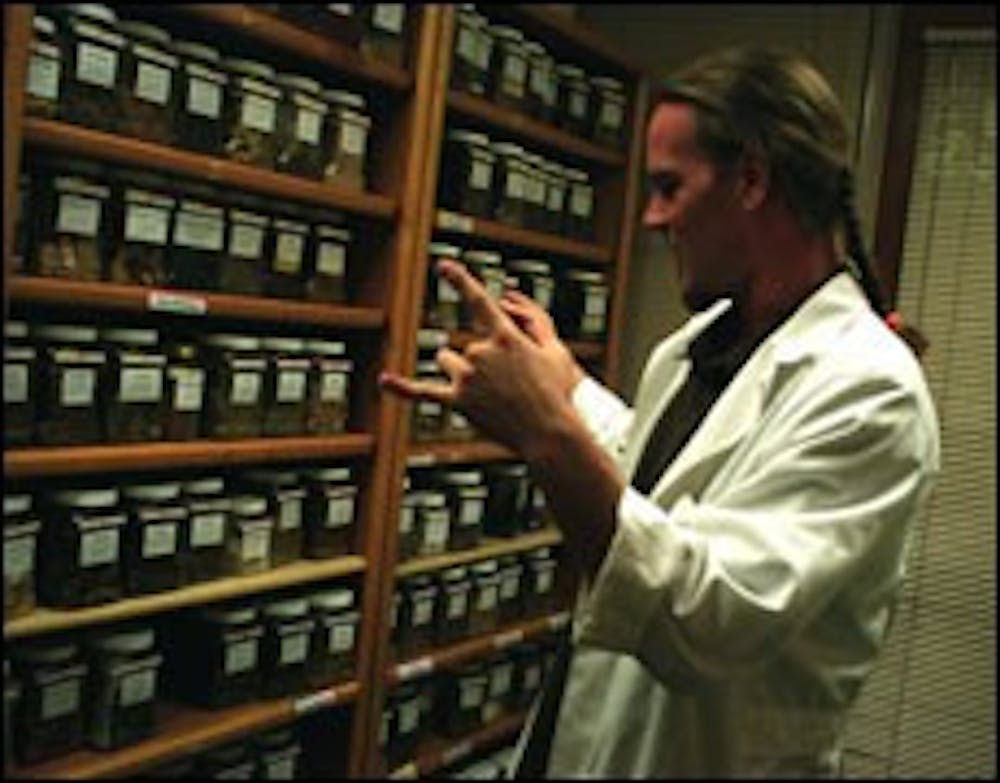I couldn't breathe.
I couldn't breathe through my nose that is. The infamous summer cold caught me, along with half the students on campus. During class, I sat open-mouthed feeling like a tired, panting dog on a hot day, completely miserable. Something had to be done. But, I just didn't think Acupuncture was it. Images of little old men sticking thousands of thick, sharp, painful needles in my back and legs flashed through my mind. Of course I was wrong.
The sun was setting as I drove up to the Phoenix Acupuncture Institute of Herbal Medicine and Acupuncture one Thursday afternoon. Tall, white, and bland on the outside, the building looked like any traditional office.
Appearances can be deceiving, I soon learned. A stream flowed through a miniature man-made rainforest inside the courtyard. It smelled like fallen rain.
Inside, the clinic looked like a normal doctor's office: small, clean, with people running around in white lab coats. And, like every doctor's office experience, the man behind the counter handed me an extensive medical history form.
I expected to answer the usual brief questions: "History of diabetes in family?" Yes. "Diagnosed with malaria?" No.
Instead, I faced a plethora of questions that wanted to know more about me than I even knew. I answered all of them honestly, and it took me a half-hour to get through.
"Chinese medicine brings a person back to a state of balance," says Scott Anderson, the man behind the counter and an instructor and director at the Institute.
"The body lives in constant motion, and when it is out of balance, Chinese medicine, like acupuncture, nudges the scale, and brings it back into harmony. Both Chinese medicine and Western medicine has its own place," Anderson says.
Acute problems work well with Western medicine, while Chinese medicine handles other issues, he adds.
"They do different things very well," he says, telling me how Western medicine saved his mother who had a heart attack, but couldn't help a woman with recurring migraines. After a few months of acupuncture treatment, the women who had been living with migraines for five-years, said she felt her health improve drastically. But acupuncture does not offer a quick fix; treatment can take time and repeated visits.
"It's disheartening when a person doesn't give you the time you need to help them," Anderson says, just as my acupuncturist comes to get me.
He leads me into a mostly bare room. Not the short, old Chinese man I imagined, my acupuncturist, Brent Timco, is young, white and friendly. A blonde braided ponytail hangs on his neck, covering half a tattoo. The tattoo means "path" or "way" in Chinese, he says. Very fitting for this advanced acupuncture student.
Timco gets his supervisor, Gary Cordova. He sits and asks me to tell him everything that is going on.
"Everything?" I repeat in a worried tone. I imagine hours spent explaining family history, early childhood memories, dating problems and school issues.
"Just what has been bothering you lately," he quickly adds, with a little laugh.
I tell him about my cold and a few other medical issues.
After discussing me with Timco, they come up with a treatment. Acupuncture works with specific points and pathways. It's not the random sticking of needles I envisioned. Every needle hits a certain spot to allow channels of the body to open and movement to continue.
I change into a hospital gown and await the painful plunge of the needle. But it didn't hurt. Timco works with the hair-thin needles and pays attention my breathing as he places them on my body. As I exhale, the needle goes in. He moves it slightly until I feel it, but no pain comes. He repeats this process on about four places on my back, with two needles on either side of my backbone, and needles on my hand and arms. About 10 needles sit in my skin. Timco turns on relaxing instrumental music and says he will return in 10 to 15 minutes.
"Just sit here and connect to your body," he says. The 15 minutes seem to stretch longer. My body relaxes slowly, and I pass in and out of consciousness. Timco returns, takes out the needles, throws them away and tells me to take my time getting up. I need it. I am so relaxed, I struggle to focus my eyes.
As I leave, they gather some Chinese herbal medicine for me. I grab the pills and promise to return again. Exhausted, I slept better that night than I had in a long time. The next morning I wake up. I realize something is different: I can breathe.
Reach the reporter at samantha.xanthos@asu.edu.




